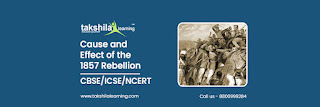What was the immediate cause of the revolt of 1857?
Immediate Reason for the 1857 Rebellion
The immediate cause was the requirement to use the 'Enfield' weapon. Before being inserted into the pistol, the cartridge had to be chewed off. The cartridge was lubricated with either pig or cow fat, according to the Indian sepoys. It was offensive to Hindu and Muslim feelings. As a result, they were hesitant to use the "Enfield" weapon. The soldiers were furious at the British. As a result, this became a flashpoint. It is supposed to have sparked the 1857 Rebellion.
What were the causes of the failure of the 1857 revolt?
The Failure of the 1857 Rebellion
The uprising failed to drive the British out of the country for various reasons.
1. Military Motives
- The British army had a better organisation.
- The troops were well-supplied.
- The insurgents were running out of supplies and ammo.
2. Ideological Motives
- All sections were devoid of participation (Princess and educated classes). Some even thought British rule was good for Indian civilization.
- The educated elite considered the insurgency as backward and violent.
- The insurgents provided no viable alternative to feudalism (the zamindari system).
3. Administrative Justifications
- The insurgency was unstructured because there was no planning among the insurgents.
- It was unable to get proper direction because the insurgency lacked a clear leader.
- The insurgency erupted solely in the Northern Plains, and it failed to acquire traction in the rest of the state.
Read more

Comments
Post a Comment
Thank you we will contact ASAP.